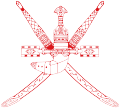Flag of Oman
This article needs additional citations for verification. (July 2021) |
 | |
| Use | National flag, civil and state ensign |
|---|---|
| Proportion | 4:7 |
| Adopted | 22 May 2004 (slight adaptation from 1970) |
| Design | Two horizontal stripes of upper white and lower green, separated by a red horizontal "T" shape in the centre that contains with the National emblem of Oman |
| Designed by | Qaboos bin Said |
The national flag of Oman (Arabic: علم عُمان) consists of two horizontal stripes of upper white and lower green, separated by a red horizontal "T" shape in the centre that contains the national emblem of Oman (Khanjar and two swords).
Design
[edit]
Meaning behind the colours
[edit]| Scheme | Textile colour |
|---|---|
| Red | The colour of flag of the former Sultanate of Muscat and Oman. It symbolises the battles fought by Omanis to evict foreign invaders from the country. |
| White | represents the conviction of the Omani people in peace. |
| Green | represents the fertility and greenery of the land. |
| Source | [1] |
History
[edit]Until 1970, Oman used the plain red banner of the indigenous people. In 1970, the Sultan introduced a new national flag and set of ensigns. The simple red flag of Muscat and Oman was modified by addition of the white and green bands to the fly, and the national emblem, the badge of the al-Busaidi dynasty, was placed in the canton. This depicts crossed swords over a khanjar, a traditional curved dagger. White has been associated historically with the Imam, the religious leader of Oman, and at times the political rival to the ruling Sultan. It also symbolizes peace. Green is traditionally associated with the Jabal al-Akdar, or "Green Mountains," which lie toward the north of the country. Red is a common color in Gulf state flags. The national emblem is said to date back to the 18th century. A curved dagger is fastened over a pair of crossed swords. An ornate horsebit links the weapons and culture.
Between 1970 and 1995, the size of the middle band of the triband was slimmer than the other two, making up approximately one fifth of its height, the other bands two-fifths.
On 25 April 1995, the flag's proportions were changed from 3:4 to 1:2.[2]
On 22 May 2004, the flag's proportions were changed to 4:7.[3]
Other flags
[edit]The naval ensign shows an azure (blue) field, with the flag of Oman in the canton and the naval service emblem in the fly.
The standard of the Sultan of Oman is red with a green border whose width is about one-sixth of the height of the flag, surrounded by a red border of about the same width. It bears the country's emblem as a charge in the center, colored gold.
Gallery
[edit]-
3:2 ratio version
-
Flag of the Royal Army of Oman
-
Ensign of the Royal Air Force of Oman
-
 Naval Ensign of the Royal Navy of Oman
Naval Ensign of the Royal Navy of Oman -
Flag of the Sultanate of Muscat and Oman 1856–1970
-
Imamate of Muscat and Oman 1868 to 1871[4]
-
Flag of the Imamate of Oman from 1954 to 1959
-
The official emblem of Oman as provided by the government.
-
Sultanate of Oman Flag from 1970 to 1995
References
[edit]- ^ Admin_2, Ofm. "Flag, Emblem and National Anthem". www.fm.gov.om. Retrieved 2025-05-30.
{{cite web}}: CS1 maint: numeric names: authors list (link) - ^ "قصة تصميم أول علم لسلطنة عُمان". جريدة الرؤية العمانية (in Arabic). 2025-04-20. Retrieved 2025-05-30.
- ^ "مرسوم سلطاني رقم ٥٣ / ٢٠٠٤ بإصدار قانون علم الدولة وشعارها ونشيدها الوطني – Qanoon.om" (in Arabic). Retrieved 2025-05-30.
- ^ "Sultanate of Muscat and Oman until 1970 (Oman)". www.crwflags.com. Retrieved 2021-06-20.







![Imamate of Muscat and Oman 1868 to 1871[4]](http://upload.wikimedia.org/wikipedia/commons/thumb/4/45/WhiteFlag.png/120px-WhiteFlag.png)



